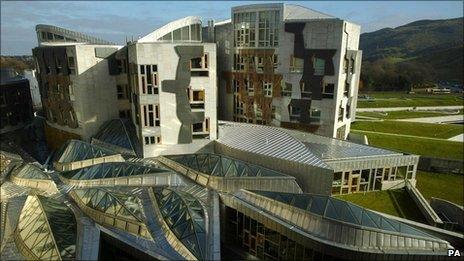Holyrood to get new budget powers under Scotland Bill
- Published

UK ministers say the new Holyrood powers will make the parliament more accountable for the cash it spends
Scotland will receive major new financial powers worth £12bn under UK government plans which will see it control a third of its budget.
Scottish Secretary Michael Moore outlined the tax and borrowing powers as he published the Scotland Bill.
Other areas, including control over air weapons and drink-driving and speed limits, will also be devolved.
But the SNP Scottish government said the bill was too limited, and branded it a "missed opportunity".
The proposals were backed by Scottish Labour, the Lib Dems and Tories and the parties demanded SNP ministers to make time for an early debate on the bill at Holyrood.
The Scotland Bill, launched in Edinburgh, follows the findings of the Calman Commission review of devolution, external, which recommended Holyrood should be allowed to raise half of income tax.
Under the legislation, Holyrood will set a Scottish income tax rate each year from 2015, applying equally to the basic, higher and additional rates.
At the same time, there would be a reduction of some 35% in the Scottish budget Treasury grant, worth about £30bn a year.
The bill will also see the introduction of Scottish government borrowing powers for the first time, worth £2.7bn.
Mr Moore said the package of measures represented the biggest transfer of fiscal power to Scotland since the creation of the United Kingdom.
"It is a powerful blueprint which will strengthen Scotland by improving devolution," he said.
"Future Scottish governments will have more accountability to the public for the financial decisions they make and will have access to significant borrowing powers.
"Devolution has worked well over the last decade but today's bill addresses a number of major issues and takes the settlement forward in a powerful and positive way."
Other powers to be devolved include stamp duty and landfill tax - although plans to hand over powers on the aggregates levy and aviation tax have been put on hold.
Mr Moore said the first tax was currently subject to a dispute in the European courts, while the latter was under review by the UK government.
Scotland already has the ability to vary income tax by 3p in the pound, although the so-called Tartan tax has never been used.
The new legislation would require MSPs to set an annual income tax rate.
The bill also allows Holyrood to introduce new Scotland-specific taxes, subject to Westminster approval, and Scottish ministers will also join a new UK-Scottish tax committee.
Scottish First Minister Alex Salmond welcomed the prospect of new devolved justice powers - but argued Scots wanted far greater financial responsibility, like full fiscal autonomy.
"This bill was a great opportunity which the UK government has missed," he said, adding: "Unfortunately, people will be disappointed by a lacklustre Westminster bill that tinkers around the edges, retains the key powers in London, and leaves big questions unanswered.
"The fiscal powers are far too limited, and, for the sake of Scotland's economy and public services, the bill needs to be strengthened either by the Scottish Parliament or the people."
The first minister added: "A big unanswered question is why the Scottish Parliament is being asked to sign a blank cheque, with the Westminster government expecting Scotland to pay for the very limited extra powers."
The Scottish government also published its own commentary on the proposals in the bill, external.
MSP Patrick Harvie, of the pro-independence Scottish Greens, said the Scotland Bill was part of a "flawed process, dominated by the interests of political parties rather than Scotland's people".
Holyrood opposition groups said parties which rejected independence won 80% of the vote in the 2007 Scottish election.
In a joint statement, the leaders of Scottish Labour, the Tories and Lib Dems - Iain Gray, Annabel Goldie and Tavish Scott - said: "More than a decade after devolution, the time is right to take the next steps in developing Scotland's democracy, its relationship with the other nations of the UK, and indeed the UK's territorial constitution.
"This bill provides the Scottish Parliament with the opportunity to do just that, and so serve the people of Scotland better.
"We intend to work together to make sure it takes that opportunity."
In other areas, certain powers over the running of Scottish elections will be devolved to Holyrood, along with responsibility to determine which doctors can administer specific medication to drug addicts.
A Scottish Crown Estate Commissioner will also be created and Scottish and UK ministers will act jointly when appointing the BBC Trust member for Scotland.
The term "Scottish government" will also be formally recognised, in place of the previously used title, "Scottish Executive".
The UK government chose St Andrew's Day to launch the bill - the planned date for the Scottish government's independence referendum, which was dropped because of a lack of parliamentary support.
- Published30 November 2010
- Published28 November 2010
- Published25 November 2010
- Published8 June 2010